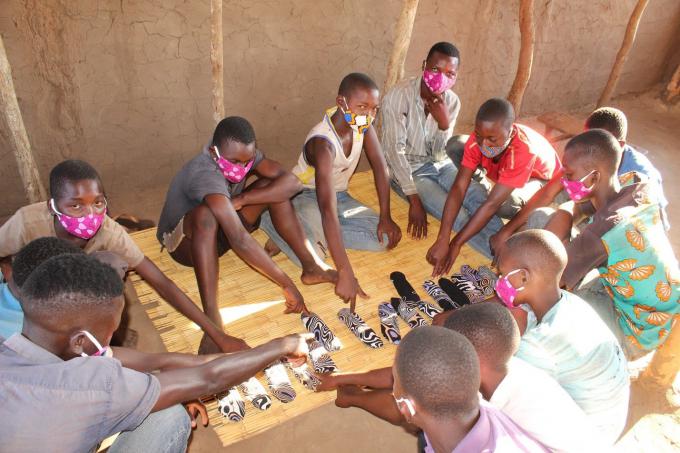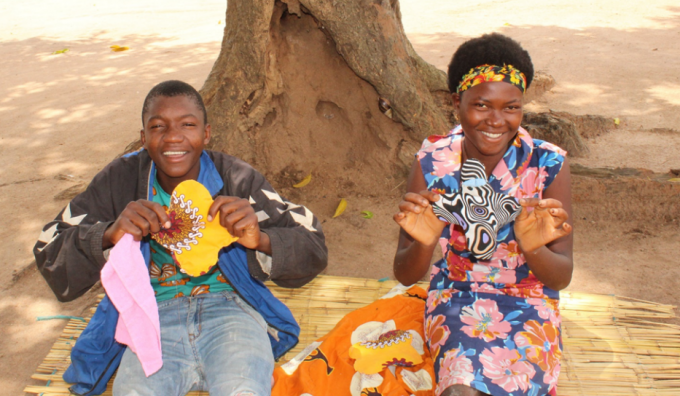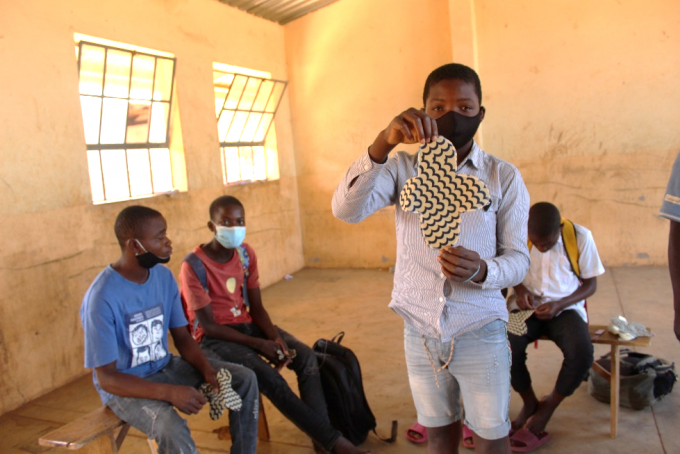BOYS AND GIRLS WORK TOGETHER TO FIGHT MENSTRUATION STIGMA
Upon entering Milange, in the central province of Zambézia, an unexpected sight awaits you. The boys are gathered under a tree with a needle and thread in their hand. They are learning to make homemade, reusable menstrual pads. “At first I thought it was really weird when the mentor said we were going to learn how to make menstrual pads,” said 17-year-old Raul. “Over time, I started to realize that we should know how to help girls who end up dropping out of school for fear of getting dirty.”

Indeed, thousands of women and girls in Mozambique face stigma and social exclusion during their menstrual periods; they lack access to resources and social support to manage their menstrual hygiene in a dignified and healthy way.
In many rural areas of the country, girls miss school during their menstrual periods, often causing them to delay their studies and drop out of school. The Ungumi Project focused on identifying and addressing all the driving motifs girls do not attend classes during their menstrual periods and mobilizing girls and boys to be the changemakers.
Save the Children's Ungumi project works with adolescents, parents, guardians, teachers, health professionals and community leaders to improve access to and quality of information and services on sexual and reproductive health and the rights of adolescents ageda 10 to19 in 43 communities in three districts of Zambézia province. A key element that propelled the initiative was the need to guarantee the sexual and reproductive rights of girls in order to eliminate the taboos associated with menstruation, as these have a major impact on the quality of life of women and girls.

Through the Ungumi project, girls were taught how to make their own reusable, homemade menstrual pads using local materials. Traditional menstrual pads were uncomfortable and unreliable as they leaked and slipped, which led to the spread of false beliefs, bullying and teasing, perpetuating girls' feelings of shame and isolation, sometimes even leading them to drop out of school. The new pads are more absorbent and fasten under normal underwear with a button, which means they don't slip or leak. This helps girls feel more confident and able to engage in daily activities, including attending school.
Nevertheless, the Ungumi Project decided to take the approach a step further, by involving boys in the battle against the stigma of menstruation. Often in rural communities, menstruation is a taboo topic, especially for boys. It's something they don't talk about and therefore don't know.
Every year on May 28, Save the Children joins the global Menstrual Hygiene Day advocacy platform to help break the taboos and stigmas around menstruation. It is also a time to raise others' awareness on the matter. The project decided not only to educate boys and discuss menstruation with them, but also to involve them in making menstrual pads as a way to help them understand the challenges girls face during menstruation. The project created a safe space for healthy discussions and dialogues about puberty, body changes in girls and boys and gender equality between them.
“Here in the community, we hear that when a girl is menstruating, she cannot talk to the boys or put salt in the food, because if she does, the boy will get a disease in the sexual organ, but now we know that this is not the case,” shared Eduardo, 17.

Gil, 15, learned to make menstrual pads. He said: “It was good to learn how to make the pads, so now I can teach my younger sisters. I've heard that traditional menstrual pads drip and fall off easily. If you don't have the money to buy the conventional pads at the store, homemade ones are the best option.”
Samuel learned to make pads and helped other boys understand menstruation better and make reusable pads. “At first I didn't know anything about it, but after learning how to make pads, I started teaching my colleagues. The day I learned to do it, I took a sample home to show my family. My older sister, who had just given birth, asked me if she could keep it for herself and I offered to make more.”
In 2021, on Menstrual Hygiene Day, 566 million people were reached with positive and impactful imagery to help break the stigma around menstruation. This year, the aim must be to continue the pace and achieve even more.
 Mozambique
Mozambique